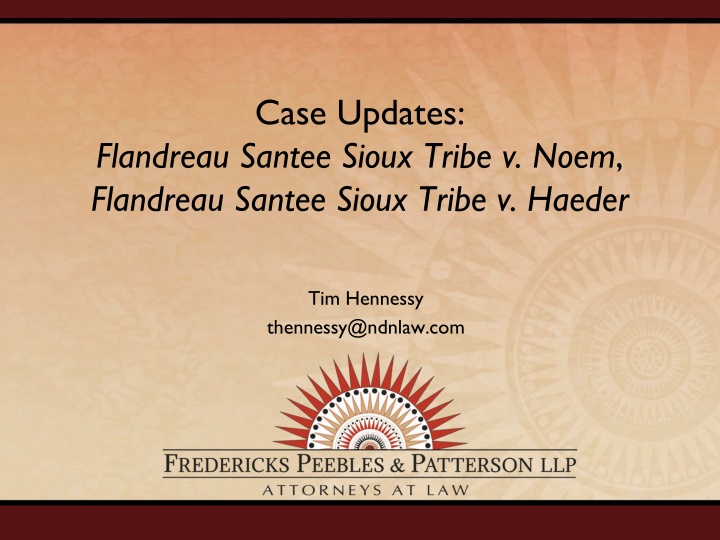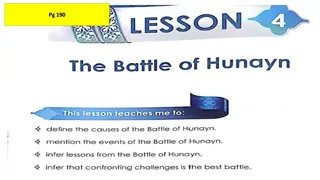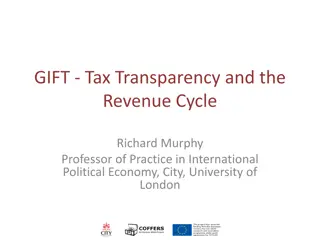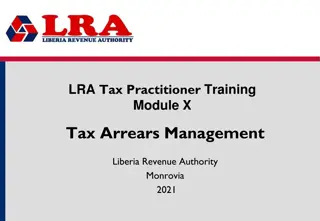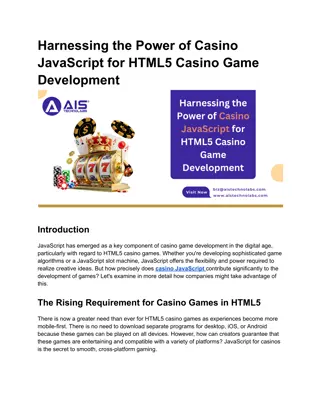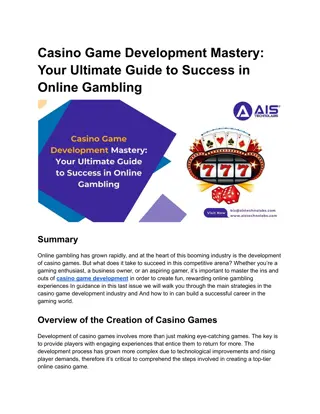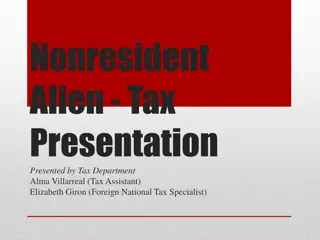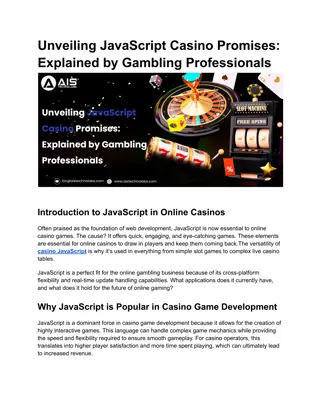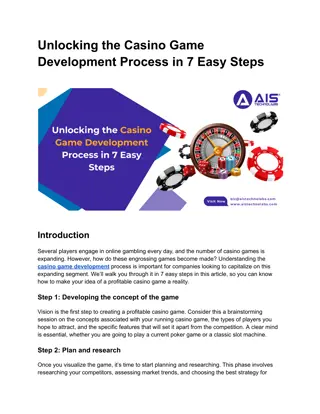FSST v. Noem: Legal Battle Over Casino Amenities Use Tax
The legal case of FSST v. Noem involves South Dakota's refusal to renew the Flandreau Santee Sioux Tribe's casino alcohol licenses due to the tribe's customers being required to pay a use tax on all purchases at the casino, including gaming amenities. The 8th Circuit Court ruled that the use tax on casino amenities was pre-empted under the White Mountain Apache Tribe v. Bracker balancing test, as the amenities significantly contributed to the tribe's economic success in Class III gaming operations at the casino.
Download Presentation

Please find below an Image/Link to download the presentation.
The content on the website is provided AS IS for your information and personal use only. It may not be sold, licensed, or shared on other websites without obtaining consent from the author.If you encounter any issues during the download, it is possible that the publisher has removed the file from their server.
You are allowed to download the files provided on this website for personal or commercial use, subject to the condition that they are used lawfully. All files are the property of their respective owners.
The content on the website is provided AS IS for your information and personal use only. It may not be sold, licensed, or shared on other websites without obtaining consent from the author.
E N D
Presentation Transcript
Case Updates: Flandreau Santee Sioux Tribe v. Noem, Flandreau Santee Sioux Tribe v. Haeder Tim Hennessy thennessy@ndnlaw.com
FSST v. Noem: use tax on casino amenities South Dakota law requires collection and remittance of use taxes on nonmembers purchase on reservation as a condition of alcohol license renewal. South Dakota refused to renew the Tribe s casino alcohol licenses on the basis the customers of the Tribe owed a use tax on all purchases of goods and services at the Casino including gaming amenities such as hotel rooms, food, drinks, gift shop, and live entertainment. A/k/a FSST v. Gerlach, FSST v. Terwilliger. District court decisions: 155 F.Supp.3d 972 (2015); 269 F.Supp.3d 910 (2017). Feb. 13, 2019 oral argument available at https://www.ca8.uscourts.gov/oral-arguments 8th Circuit decision issued September 6, 2019. 2019 WL 4229068. Judge Loken wrote majority opinion, joined by Judge Kelly. Judge Colloton dissented from the Bracker part of the opinion.
FSST v. Noem 8th Circuit Opinion First, the Indian Gaming Regulatory Act does not explicitly pre-empt state imposition of use tax on the purchases of Casino customers of gaming related amenities. 25 U.S.C. 2710(d)(4) only preempts state taxes imposed on gaming itself not amenities 25 U.S.C. 2710(d)(3)(C)(vii) applies to subjects directly related to the operation of gaming activities not subjects that are, at best, directly related to the operation of the Casino.
FSST v. Noem 8th Circuit Opinion Continued Second, the Court held the use taxes are pre-empted under the balancing test in White Mountain Apache Tribe v. Bracker. The summary judgment record established that the amenities contribute significantly to the economic success of the Tribe s Class III gaming at the Casino. Complementarity; tribal sales tax. The record also showed the Casino s significance in promoting tribal economic development and self-sufficiency. Op. at 10. Gaming revenue allocation plan A federally-regulated activity is involved. Op. at 10. The Tribe is not simply selling a State tax exemption to nonmembers. Op. at 10. South Dakota only has a generalized interest in raising revenue, and no legitimate regulatory interest in the taxed activity.
FSST v. Noem 8th Circuit Opinion Continued Bracker issue pull quotes: The State s taxation of the Casino amenities would raise their cost to nonmember patrons or reduce tribal revenues from these sales. Even if gaming was not thereby reduced, the impact would be contrary to IGRA s broad policies of increasing tribal revenues through gaming and ensuring that tribes are the primary beneficiary of their gaming operations to promote tribal economic development, self-sufficiency, and strong tribal governments. Op. at 11. The State s interest in raising revenues to provide government services throughout South Dakota does not outweigh the federal and tribal interests in Class III gaming reflected in IGRA and the history of tribal independence in gaming recognized in Cabazon. Op. at 11-12.
FSST v. Noem 8th Circuit Opinion Continued Third, the Court overturned the lower court s ruling that the State cannot condition renewal of tribal liquor licenses on payment of a use tax unrelated to alcohol sales. Op. at 14. The Court determined that the issue was not whether the state exceeded its authority to regulate alcohol in applying the tax, but rather, whether the liquor license condition of collecting the use tax, will unduly interfere with the Tribe s Class III gaming activity. Op. at 14. Because the Tribe did not address this question below, the Tribe failed to meet its burden to demonstrate that the State alcohol license requirement is not reasonably necessary to further its interest in collecting valid state tax. Op. at 15.
FSST v. Noem Status of the Case: both sides requested rehearing on Sept. 20, 2019 South Dakota filed a petition for rehearing on the Bracker preemption issue, arguing the Court s decision ignored the State services provided to nonmember patrons, and conflicts with the Court s ruling in FSST v. Haeder, in holding that the state s uniformity in application of tax law and raising revenue was insufficient, and arguing that the Tribe failed to adequately quantify its losses from imposition of the tax. The Tribe filed a petition for rehearing on the ruling on the alcohol license, on the basis the court ignored the relevant issue and applied an incorrect test, creating a conflict with the 9th and 10th Circuit s decisions in Squaxin Island Tribe v. Washington, 781 F.2d 715 (9th Cir. 1986), and Chickasaw Nation v. State of Oklahoma ex rel. Oklahoma Tax Commission, 31 F.3d 964 (10th Cir. 1994), which recognized that state taxes imposed on alcohol are permissible under 18 USC 1161, when related to the regulation of alcohol.
FSST v. Noem FSST s case The Tribe demonstrated the following facts on summary judgment: Gaming and casino amenities are complementary (Jonathan Taylor expert testimony) State does not provide on- reservation services to the casino or its patrons, or extensively regulate the casino, and anything it does do is not funded by the use tax imposed. Tribe provides extensive services and regulation of casino and patrons at its own cost. The alcohol permit conditioned on payment of use tax raises the following issue: Rice v. Rehner, 463 U.S. 713 (1983),identified state interests, and concluded that to address that interest, Congress delegated concurrent authority to states to regulate alcohol on reservation. States have an interest in the liquor traffic that occurs within [state] borders, specifically the spillover effect of liquor sold on-reservation that find[s] its way out of the reservation[.] 18 U.S.C. 1161 grants the State authority to regulate liquor not to impose obligations unrelated to liquor regulation. FSST complies with all liquor regulation laws and pays liquor taxes.
FSST v. Noem What does the 8th Circuit s decision mean for other tribes? State use tax cannot be imposed on Casino amenities that contribute to the economic success of the Casino, where the State does not have a specific, legitimate regulatory interest in the taxed activity. Can State taxation of Casino amenities be addressed in a gaming compact? 8th Circuit seems to say no. Can State taxation of Casino amenities be addressed in a tax compact? Probably yes, if Tribe and State are willing. States may be able to leverage liquor license authority to demand tribal compliance with unrelated state laws.
FSST v. Haeder: tax on casino construction FSST successfully negotiated an increased number of machines in its gaming compact. This resulted in the need to renovate the casino to increase the gaming floor to accommodate the machines. In addition, the HVAC system was failing and, to compete with a larger casino recently built nearby, the Casino finishes and amenities needed an upgrade. The Tribe hired a non- Indian contractor to do the work. The State imposed a 2% contractors excise tax on the construction and materials resulting in a tax of about $480,000. The Tribe filed suit. District court decision: FSST v. Sattgast, 325 F.Supp.3d 995 (2018). Feb. 13, 2019 oral argument available at https://www.ca8.uscourts.gov/oral-arguments 8th Circuit decision issued September 6, 2019. 2019 WL 4231360. Judge Loken wrote opinion for the Court, Judge Colloton concurred in the judgment, and Judge Kelly dissented.
FSST v. Haeder 8th Circuit Opinion First, IGRA does not expressly preempt State taxation of Casino construction. Incorporates Part I of Noem. 25 U.S.C. 2710(d)(4) does not preempt state taxation other than taxation of Class III gaming activity. Op. at 5. The catchall provision, 25 U.S.C. 2710(d)(3)(C)(vii), does not cover Casino construction. Op. at 5. 25 U.S.C. 2710(b)(2)(E) delegates management of casino construction to Tribes, and the NIGC does not actively regulate casino construction. This provision does not preempt the contractor s excise tax, which does not regulate or interfere with the Tribe s design and completion of the construction project, or its conduct of Class III gaming. Op. at 6.
FSST v. Haeder 8th Circuit Opinion Continued Second, the State s tax on Casino construction is not preempted under Bracker balancing. It is a one-time tax on nonmember services to the Tribe, some of which are performed off the reservation. This tax hardly implicates the relevant federal and tribal interests. Op. at 7. Most significantly, there was no evidence the tax will impede the Tribe s ability to conduct its Class III gaming activities to generate gaming revenue. Op. at 8. The tax burden is a small percentage of the gross Casino revenues. Court would like to see a showing that the effect of the tax would be to reduce the demand for the Casino s commercial activities But the Court also says, The Tribe cannot invalidate the South Dakota tax by complaining about a decrease in revenues. Other federal and tribal interests are not implicated. Op. at 8. Promoting strong tribal government Ensuring tribal control of gaming operations in Indian country
FSST v. Haeder 8th Circuit Opinion Continued The State s two interests outweigh the relevant federal and tribal interests. Significant interest in raising revenue for its general fund to provide services to residents including the contractor. Op. at 8. The relevant services provided by the State include those that are available to the contractor and the members of the Tribe off the reservation as well as on it. Op. at 9. Main opinion does not identify any such interests, but the concurring opinion cites the licensing of architects, electrical inspection & permitting, and the possibility that the State could approve a paving- mix manufacturer for the project. Op. at 10. And the separate sovereign interest in being in control of, and able to apply, its laws throughout its territory. Op. at 8.
FSST v. Haeder 8th Circuit Opinion Continued The dissenting opinion: Agreed that (like Noem) IGRA does not expressly preempt this tax. But would have held that (like Noem) Bracker balancing preempts the tax. Tribe has an interest in retaining the $480,000 and using it to promote tribal self-sufficiency through operation of the Casino. Op. at 11. Tribe s interest in this case was even more direct than in Noem because the project was necessary to expand the gaming floor to accommodate more machines. Op. at 11. The amount of money is substantial, and it surely means more to the Tribe than to South Dakota, which has an annual budget of over $4 billion. Op. at 12. Federal government has an interest in overseeing Casino construction, and shares the Tribe s interests in tribal self sufficiency and economic development. Op. at 12. State has only a generalized interest in collecting tax with no specific connection to the taxed activity. The only instance of the State actually providing actual services an electrical inspection was funded with fees paid by the Tribe, not with revenues from the contractor s excise tax. Off-reservation benefits conferred on the contractor cannot justify the on- reservation tax. Op. at 11, citing Ramah.
FSST v. Haeder Status of the Case: Tribe requested rehearing on Sept. 20, 2019 Tribe filed a petition for rehearing on the basis that, contrary to Supreme Court and Eighth Circuit precedent: The Court misconstrued IGRA Which expressly and preemptively places Casino construction within the authority of tribal and federal governments, allowing states to acquire authority, if at all, only through a gaming compact And misapplied the Bracker balancing test By giving weight to the State s off-reservation services and services not funded by the tax at issue By giving weight to the State s general interest in imposing tax everywhere within its borders By minimizing the Tribe s interests as pertaining only to Casino revenues, while ignoring tribal costs and ignoring the effect on tribal self-sufficiency and sovereignty. Remaining issue on remand District court did not rule on Tribe s claim that the Indian Trader Statutes preempt the tax.
FSST v. Haeder What does the 8th Circuit decision mean for other tribes? Casino construction and renovation is subject to contractor s excise tax. Permits states to argue a one-time tax is not substantial enough to be preempted. Permits states to include their off-reservation services to nonmember taxpayers in conducting Bracker balancing. Permits states to rely exclusively on generalized interests in raising revenues and applying tax laws. Can State taxation of Casino construction be addressed in a gaming compact? 8th Circuit seems to say no. Can State taxation of Casino construction be addressed in a tax compact? Yes, if Tribe and State are willing.
